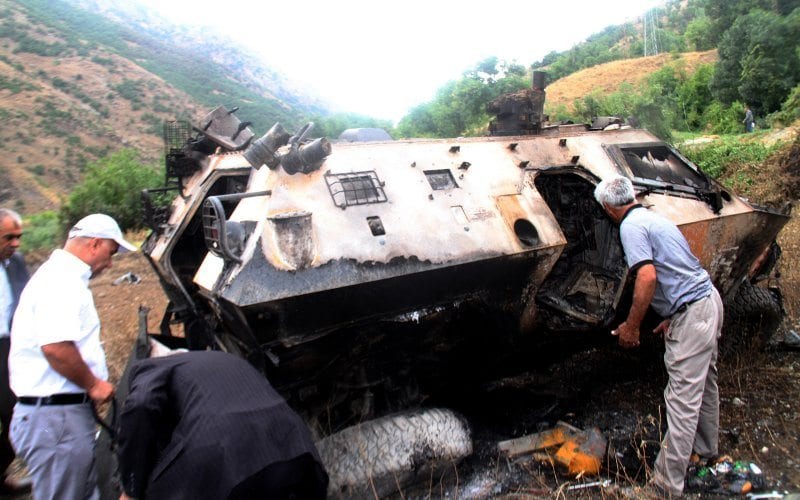After being accused of joining the campaign against ISIS just to attack the Kurds, Recep Tayyip Erdogan is doubling down—hitting the rebels even harder. But will it win him an election?
 ISTANBUL—Turkish President Recep Tayyip Erdogan is betting that increased pressure on Kurdish rebels in southeast Anatolia will be a vote-getter in snap elections less than two months away.
ISTANBUL—Turkish President Recep Tayyip Erdogan is betting that increased pressure on Kurdish rebels in southeast Anatolia will be a vote-getter in snap elections less than two months away.
But a flare-up of Kurdish rebel attacks that have inflicted the heaviest losses on Turkish soldiers in years has Turks wondering whether Erdogan is dragging the country to war to suit his own political needs.
So devastating was the shock of the latest attack by rebels from the Kurdistan Workers’ Party (PKK) near the Turkish border with Iraq on Sunday that the government and the military waited more than 24 hours before revealing that 16 soldiers had died. It was the highest death toll for the Turkish army in a single combat event since 2011.
Fighters from the PKK, a rebel group designated a terrorist organization by Turkey, the United States, and Europe, attacked a military convoy in the town of Daglica and blew up a number of military vehicles with roadside bombs. The well-connected security analyst Metin Gurcan said on Twitter that 500 to 600 rebels attacked the soldiers, while bad weather prevented Turkish attack helicopters from helping the encircled troops. The PKK said at least 31 soldiers were killed.
In the aftermath, Prime Minister Ahmet Davutoglu held emergency meetings with advisers and Turkey’s chief of general staff, Hulusi Akar, and requested a meeting with opposition leader Kemal Kilicdaroglu, a rare step in Turkey’s polarized political scene. Addressing the public Monday evening, Davutoglu pledged that the mountains of southeastern Anatolia would be “cleansed” of rebels.
While the government is promising a tough response to the new PKK attack, Kurdish politicians say government security forces are responsible for the killings of six civilians in the southeastern city of Cizre, which the army and police have closed off while they fight the PKK. A delegation of the legal Kurdish party HDP said after a visit to the city that police were stopping ambulances carrying injured and sick people to the hospital. A 10-year-old girl was killed by a police sniper inside her own home, they said.
Following news of the soldiers’ death in Daglica, Turkish nationalists attacked HDP offices in several cities around the country. Even before the latest flare-up, violent clashes between Turks and Kurds were on the rise. Turkish right-wingers in Istanbul stabbed a 21-year-old Kurd to death after they overheard him speaking Kurdish on his cellphone, the leftist Evrensel newspaper reported Monday.
With tensions heightened across the country, Erdogan declared in a television interview that things would be different if parliamentary elections in June had produced a majority in the house to change the constitution and introduce a presidential system with him at the helm. Critics say Erdogan sabotaged the search for a new government after the June election, in which his AKP party lost its parliamentary majority. They say Erdogan pushed through the new election, scheduled for Nov. 1, in the hope of winning back the AKP majority and, ultimately, getting the presidential system he wanted.
One recent survey shows that 56 percent of voters hold Erdogan responsible for the latest flare-up of violence, which began in late July.
Kilicdaroglu, the opposition leader, has accused Erdogan of stoking tensions in southeast Anatolia to attract nationalist voters to the AKP. “He is responsible for the blood that is being spilled and for terrorism,” Kilicdaroglu said last month, adding of the AKP’s leaders: “They want to stay in power with the help of chaos.”
The leader of the Kurdish HDP party, Selahattin Demirtas, echoed Kilicdaroglu, saying Erdogan and his ruling party are hoping a new Kurdish conflict will help to win back their parliamentary majority. “The AK Party is dragging the country into a period of conflict, seeking revenge for the loss of its majority in the June election,” Demirtas said.
Outside Turkey, Eric Edelman, a former U.S. ambassador to Ankara, argues Erdogan is bent on regaining control over parliament in order to push through the presidential system that would give him wide-ranging powers. To that end, Erdogan is portraying the HDP as the political arm of the terrorist PKK and trying to “steal votes” from the right-wing MHP party. Airstrikes against the PKK have reignited “a conflict that had been on the road to resolution,” Edelman wrote in an Op-Ed late last month in The New York Times.
Turkey’s harsh response angered U.S. officials, who said Erdogan’s government was much less interested in fighting ISIS than taking out the PKK. One senior U.S. official was quoted as saying last month that the campaign against ISIS was only a “hook” for the Turks. “Turkey wanted to move against the PKK, but it needed a hook,” the official told The Wall Street Journal.
Since then, several dozen soldiers and police officers, and hundreds of PKK fighters, have died, according to Ankara. The renewed fighting shattered a cease-fire between the state and the PKK that had been in force since 2013 and fueled hope for a permanent end to the conflict, which began in 1984. Erdogan says the PKK used the ceasefire to stockpile weapons. The rebels have been attacking security forces in the region on a daily basis and putting up checkpoints.
So far, there is little evidence that Erdogan’s plan of hitting the PKK to win votes is working. Several polls show the AKP has lost even more ground, while HDP is gaining support. There is “no sign that the latest violent clashes have increased any AKP votes,” Ziya Meral, a London-based Turkey analyst, tweetedMonday.
